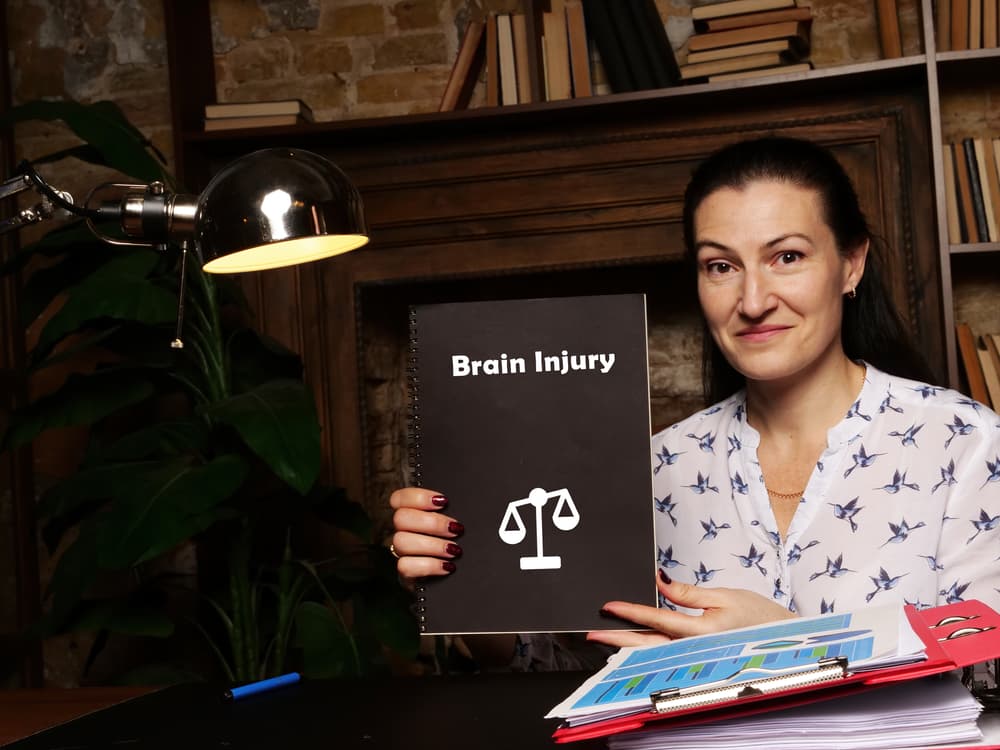Approximately 2.5 million Americans suffer a brain injury each year, and someone in the country experiences a brain injury every 15 seconds. Many victims of this devastating injury can recover fully after months or years. But others can have a permanent injury affecting them for life.
If another party caused you or your loved one's brain injury, you may have legal options. A Tampa brain injury lawyer can represent you and demand fair compensation from the at-fault party and their insurance company. This article discusses how long a brain injury claim takes and related information. If you have detailed questions, contact an experienced Tampa brain injury attorney today.
Schedule a Free Initial Consultation
What Is A Traumatic Brain Injury (TBI)?

A TBI is brain damage that is usually caused by a jolt or blow to the head. Brain injuries often happen in motor vehicle accidents and slip-and-fall accidents. However, a medical mistake or job-related incident can also cause brain injury. Some common symptoms of a serious brain injury are:
- Loss of balance
- Dizziness
- Memory loss
- Nausea and vomiting
- Headaches
- Behavior and mood changes
- Depression or anxiety
- Slurred speech
- Tremors or seizures
- Unconsciousness
A serious traumatic brain injury can cause you or your loved one tremendous stress and worry. You can lose the ability to care for yourself and live independently. If the brain injury happened because of another person's negligence, you should contact a brain injury lawyer today for a free consultation.
Types Of Traumatic Brain Injuries
There are primary and secondary brain injuries. A primary brain injury is a sudden and profound injury to your brain that happens in an immediate accident, whether it is a car accident, slip and fall, gunshot, etc.
A secondary brain injury is the changes that happen over hours or days after the main injury. The secondary injury includes many stages or steps of tissue, chemical, cellular, and blood vessel changes in your brain that cause more damage.
There are subtypes of brain injuries, as well:
- Diffuse axonal injury: This type of brain injury doesn't require the skull to be fractured or penetrated. The impact from the accident can make the brain hit the inside of the skull, causing serious damage to the brain and nerves. The injuries can affect the chemical processes and communication in the brain, causing temporary or permanent brain damage.
- Concussion: This injury can be caused by your head hitting the ground, dashboard, window, or other surface or object. Depending on how severe the concussion is, you can have swelling and bleeding in the brain and possibly lose consciousness.
- Contusion: Brain contusions usually happen when there is a direct impact on the head. It is a bruise on the brain that happens from bleeding. A discoloration can be a severe injury if the affected area is large enough.
- Penetrating injury: This is an open head wound and happens when an object penetrates the skull during an accident.
You should always seek immediate medical attention after an accident where a brain injury is suspected. Brain injuries may not be immediately apparent after the accident, so if you think you hit your head or something isn't right, go to the ER right away.
How Long Will My Brain Injury Claim Take?

If you file a brain injury claim on behalf of yourself or a loved one, it's understandable to want to know how long it will take. After all, most injured parties with brain injuries have medical bills and cannot work, so obtaining compensation promptly is vital.
Every traumatic brain injury case is unique, and it is hard to say how long it will take to resolve. However, several factors influence how long a brain injury case takes:
- How severe the injury is: If you suffer a brain injury that requires hospital stays, surgery, and rehabilitation, it can take longer to get to maximum medical improvement or MMI. Someone with a severe injury can take months or years to reach MMI. Your brain injury attorney will want to wait to demand compensation until it is clear what your prognosis is. The insurance company can fight harder if the claim is for a major, expensive injury.
- How strong the evidence is: Insurance companies may not drag the case out if you have overwhelming evidence of fault. Suppose a drunk driver slams into your car at a red light, and you suffer a serious concussion. There is likely strong evidence that the drunk driver caused the accident. The insurance company may move faster to settle the claim because taking the case to court can cost them more money. Juries tend to frown on drunk driving and extremely negligent behavior that injures others.
- How many others suffered injuries: The more complicated the accident and the number of victims, the longer the case may take.
A settlement for a serious brain injury can take longer than many other personal injury claims. A brain injury case might take several months or even years to resolve. Brain injuries are complex and harder to diagnose and treat than, say, a broken arm. So, resolving such a complicated case may take longer than a simple broken arm or leg claim.
Fortunately, your brain injury attorney will be your constant, fierce legal advocate during this process. They can work with your doctors and will wait for payment until the case settles. That way, you can get urgent medical care without worrying about the upfront cost.
Why Does A Brain Injury Case Take So Long?
The most important reason that a brain injury claim takes longer than others is that it is one of the most serious injuries you can have. The brain is incredibly important and complex, and understanding how the injury affects the brain can take years.
A brain injury can seem to improve after a few weeks, but it can worsen again. Or, it can potentially stay the same for months with little improvement. It can be difficult to know how much money to demand from the insurance company when your medical condition and prognosis are unknown.
Waiting for money can be hard, but it may be better to wait until you know how the injury will affect life quality in the future before settling. If you settle too soon, you may not have enough money for medical care and other needs later. Remember, a severe brain injury can compromise both mental and physical functions, which can affect your ability to live on your own.
If your brain injury is a long-term or permanent condition, your lawyer must ensure that you have enough money to cover all of your losses - now and in the future. Doing that can delay a settlement until your medical and financial requirements are fully understood. After you get to MMI, you can be entitled to the following compensation for a serious brain injury:
- Medical costs for the past, current, and future
- Modifications to your vehicle or home
- Loss of enjoyment of life
- Pain and suffering
- Lost income and loss of future income
- Rehabilitation
- Loss of consortium
Your lawyer will try to settle your brain injury case quickly, but negotiations may take months, and the insurance company may put up a fight. Your brain injury lawyer also must balance your immediate financial needs with the fact that you can have a murky prognosis and unknown future medical needs.
Who Pays After A Brain Injury Accident?
You may know that you aren't at fault for what happened, so someone should pay for your brain injury damages. But who? It is possible to use a variety of people and entities, depending on the case circumstances:
- The person who injured you: If another person's negligence caused the accident, they may be personally liable for your losses. For example, if a car driver hits you in a crosswalk and you hit your head on the pavement, they or their insurance company are probably liable. However, if your brain injury damages exceed the available insurance coverage, you may need to sue the driver personally.
- An employer: If the defendant was working when the accident injured you, their employer can also be liable. A common example is in commercial truck accidents. The truck driver may be liable for your injuries, but if they are a carrier's employee, the company can be liable, too. Liability extends to the company if the driver worked during the crash.
- Workers' compensation: You can collect benefits from workers' comp if injured at work. You usually cannot sue your employer for a job-related injury, but a third-party lawsuit is possible if another company is liable for your injuries.
Your attorney's primary task is identifying every potentially liable person and insurance policy for compensation. Some brain injury cases can have several liable parties. For instance, if a chain-reaction auto accident on the highway and several drivers hit you, you can file claims against all of them.
What Is My Brain Injury Case Worth?
Every injury case is different, and brain injury cases are always unique. The nature of this severe injury and how it affects your life will mostly determine how much you can get in your claim or lawsuit.
The more serious the brain injury, the more the case can be worth. If you have a serious brain injury that limits your ability to work and enjoy life for years, the case will have a higher value. But the case can be worth less if the injury is a mild concussion that heals after six weeks. Also, how much you receive in compensation depends on the strength of the evidence against the liable party and your lawyer's skill.
The claim's value also depends on the defendant's assets and insurance. If their insurance policy only covers $100,000 in bodily injury and you have $250,000 in damages, you may not receive full compensation. Your only alternative in this case would be to file a personal injury lawsuit against the at-fault party.
Discuss the potential value of your brain injury case with a brain injury lawyer today.
Common Brain Injury Myths

Researching brain injury claims online can be misleading because you may come across many myths. Here are a few:
- Brain injuries always have physical symptoms: Not all brain injuries have physical signs. You also may notice mental issues, such as memory problems, anxiety, mood swings, sleeping more or less, and difficulty thinking clearly.
- All TBIs are similar: In reality, every traumatic brain injury is different from the other. There are many types of brain injuries, ranging from mild to severe. You should always have a doctor look you over immediately after an accident where a brain injury is suspected.
- You can never recover from a TBI: Brain injuries are serious, and there can be long-term consequences. But not everyone who has a brain injury will have a permanent problem. The brain is quite resilient, and another part of the brain can make up for damage in another area. After a traumatic brain injury, you can still live a normal and fulfilling life.
- A clean MRI or CT scan means you're okay: Perhaps, but not necessarily. Not every brain injury involves structural damage to the brain. Your injury can affect tissue and nerves in the brain that the scans cannot see. Performing a neurological exam can be the best way to check for brain damage.
Contact A Brain Injury Attorney Today

Were you or a loved one injured in an accident that caused a brain injury? These are devastating and expensive injuries that can affect the rest of your life. Affording the medical care you need can be immensely challenging. You should consider filing a brain injury lawsuit against the liable person or entity.
A brain injury attorney understands what you are experiencing. They can review your brain injury case, determine who is at fault, and file a claim for your medical bills, lost earnings, and pain and suffering.
Contact a Tampa personal injury lawyer now for immediate assistance. It costs you nothing out of pocket to obtain the legal support and representation necessary for justice and compensation.
Schedule a Free Initial Consultation Today!
We proudly serve Hillsborough County, Pinellas County, Pasco County, Polk County, and its surrounding areas in Florida:
Apex Law Firm - Tampa Office
412 E Madison St Suite 1206, Tampa, FL 33602
(813) 444-5212


